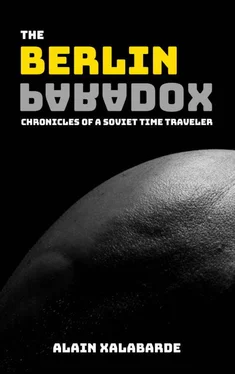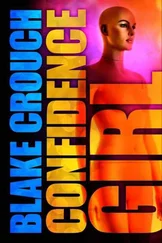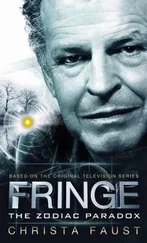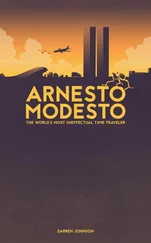The doctor keeps asking me questions at a rate that I can’t keep up with. The blanket finally arrives. I regain some consciousness and recognize the second person in the white coat. She is young and radiant. Possibly in her late twenties. Not much older than I am. Unlike with her, it’s hard to tell the doctor’s age. Dr. Vodnik has reached that age when old people are simply permanently old.
I come to my senses and immediately ask for salt. The three witnesses are taken aback by my request. I insist and explain that it is vital. The doctor motions the soldier once again. He nods and exits the room.
The doctor holds me by the shoulders and queries if I’m a German soldier. I shake my head. I now realize this is the first time they’ve ever seen me. I explain that I am not from the past, but from the future. I describe in detail how he hired me for the position and what my purpose is.
He’s skeptical. I can tell. But intrigued nevertheless.
I take advantage of the doctor’s pensive silence and ask about the current year. He says it’s 1950. I ask for the location, and although he’s hesitant at first, he reveals that we’re under the Resurrection Church. It looks very different though. They’ve only recently discovered it and had just started cleaning it up. They have no idea what this place was. Most amazingly, they’re baffled by the fact that the time booth turned on by itself, as there is no running electricity in the whole facility. He blabbers on about the possibility of wireless electricity, the Tesla coil and how there may be an undiscovered source of energy. He then immediately asks if I know of other locations. I slowly get on my feet and walk towards a worn-out map. I point with my finger the different locations that I can remember.
He takes a pen out of his pocket and marks the spots with an “X”.
I soon realize it wasn’t a good idea to stand up yet. My vision blurs and a moment later I pass out.
It’s strange to have the chance to spend time with a dead person. Looking at the doctor and knowing that he’s already dead is an unsettling feeling. I am tempted to disclose the details of his future, but I recall the dangers of revealing the future. I do get the impression he senses I am hiding something. At the same time, I try to find out what could have driven me to kill him. But maybe it’s too early. Maybe he doesn’t even know it himself. I decide to trust this earlier version of the doctor for the time being.
He’s been kind enough to let me sleep in his own apartment. Then again, maybe he only agreed to it so that he could drill me for information. Unfortunately I don’t have answers to most of his questions. I explain that I am only a traveller. I have not developed this technology nor have I directly been involved in its research. I playfully remind him that he’s the genius here, not me. He will just have to wait and discover the answers during the following years.
I haven’t left the house in over a week. They brought me directly after I passed out at the lab. We do have a good view of Berlin from here though. The doctor has settled in an impressive apartment in Prenzlauer Berg, with a balcony that oversees the Wasserturm, Berlin’s oldest water tower. Unfortunately it was also the location of the very first nazi concentration camp, only a few years ago. From what I can discern in the distance, beyond the tower, Berlin is in an even worse state than it was in the 60s. Reconstructions are still taking place and most of the city still shows traces of the heavy bombing suffered five years ago.
I can’t help but sneakily ask him if the word “Bear” means anything to him. His mouth turns into an upside down smile and he subtly shakes his head. But the subject seems to inspire him to preach yet another one of his lengthy sermons. I’ve grown accustomed to them these last couple of days. He likes to talk, and I like to listen. This time he talks about how bears have repeatedly been used in Berlin’s coat of arms for centuries. He then points out that the bear has also been an iconic symbol of Russia, dating all the way back to the 16th century. The parallelism between these two facts seems to spark his curiosity. He asks me if I was given a codename. Before I am able to shake my head as a response, he has already suggested I be called “The Bear” from now on. My heart stops for an instant, but my face does not show it. For a moment I considering suggesting a different name, but I immediately stop myself. As if afraid that I may interfere with fate.
I ask the doctor when I’ll be able to go out and have a walk. He says I should be patient. I need to recover. He joins me in the balcony and takes out a cigarette. We both stare blankly into the grey sky.
He shares his opinion about the aura that floats over Berlin. I don’t quite understand what he means, so he begins to illuminate me on the suffering that the city has endured and the changes it must still go through. Its people. He says there are no other people in the world like Berliners.
We take a moment of silence to ponder on everything he’s said. He interrupts the brief instance of meditation by adding that there are more dead Berliners right now than alive ones. He remarks that it’s only a personal guess. But he does say that in times like these, dead people have almost as much influence on the future as those who are alive. I feel like it amuses him to play with my head through the use of his words. Or maybe that’s just the way he talks. Who knows.
Out of nowhere, he asks me when was my first time in Berlin. It then occurs to me: it is now. He is a little confused by my answer. He chuckles and says that, yes, technically this is the earliest I’ve been in Berlin and therefore it could be considered the first time. So he asks me one more time, this time specifying. When in regards to my personal lifetime. I give him the same answer, but I don’t think he quite understands what I mean. He asks if this is the first time I’ve ever been here. No. Yes. I mean. I’ve been here before. I’ve been here now. He thinks I’m the one playing mind games now and simply desists. I suggest we have a walk. He takes a moment to reply. He puts out his cigarette and drops it off the balcony.
He walks back inside and tells me I should wear something discreet.
* * *
We walk in a hurry. The doctor has been trying to take breaks here and there, but I keep pulling him forward. I remember the name of a bakery. A bakery I loved. It will close down in less than a year. But I remember it perfectly. It was right in front of the pension where my mom and I stayed. We would walk down there every morning for some freshly-baked pastry. Her and I are probably taking a stroll somewhere downtown right now at this very moment. I can’t remember exactly where though.
When the doctor and I arrive to the corner, we find the bakery closed. I stand before it, looking across the street. I can clearly remember the door to the pension.
The doctor has been speaking all this time. Philosophizing mostly. I have limited myself to nodding. But his sudden silence catches my attention. I turn to him. He is staring down at me suspiciously. He asks me if there’s something bothering me. I rather not to lie, so I choose to keep silent. He takes a moment to read my face, looks at the entrance to the pension and then suggests that, if we’re going to wait, we may as well do it sitting down at a bar right beside us.
We sit right beside the window, where I can have a clear vision of the pension. The doctor has chosen to join my silence. He has ordered a drink, brought out his notepad and scribbled on it for the past two hours. As for myself, I’ve ordered a drink but haven’t taken a sip of it.
Читать дальше











